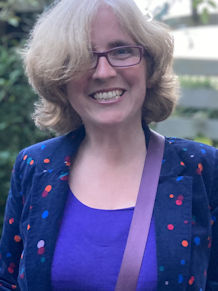Professor Kathryn Asbury
Visit Professor Kathryn Asbury's profile on the York Research Database to:
- See a full list of publications
- Browse activities and projects
- Explore connections, collaborators, related work and more
Profile
Biography
I am a psychologist who conducts research in two main areas.
The main strand of my research focuses on the communication needs and preferences of children and young people with Special Educational Needs and Disabilties (SENDs). My colleagues and I have developed ADLib, an ESRC-funded library of evidence-informed data collection tools that can support the inclusion of learning-disabled voices - including the voices of those who are non-verbal or minimally verbal - in research. I also study the educational and social experiences of learning disabled and neurodivergent children and young people and their families.
The second main strand of my research applies lessons from behavioural genetic research to education and considers the scientific and social risks and benefits of, for example, predictive DNA screening for educationally relevant traits. Both of these strands are sometimes combined, for example, in a study of the views of autistic adults and parents of nonverbal autistic children on genomic autism research. I teach Genetics in Education and Individual Differences to undergraduate and postgraduate students and I supervise PhD students pursuing projects that are relevant to SENDs, genetics in education or both.
I am currently Co-Head of Department.
Research
Overview
You can find details of my research group and research projects via the GOALS website.
Recent projects include:
- 2024 - present: Nothing about us without us: Co-producing inclusive data collections infrastructure with learning disabled people (ESRC; PI with Laura Fox as Co-I)
- 2023 - 2026: Rethinking Special Educational Needs (Nuffield Foundation; Co-I with Umar Toseeb as PI)
- 2023 - 2024: Identifying best practice in the inclusion of seldom-heard families in longitudinal qualitative research (ESRC; PI with Vanita Sundaram and Carole Torgerson as Co-Is)
- 2021 - 2022: PEAPOD - Personal Experiences of Autism and Perceptions of DNA-based-research (Wellcome Trust Centre for Future Health; PI)
Publications
Selected publications
- Asbury, K., Fields, D. & Fox, L. (2025). Step into her world: Including the voices of learning-disabled children and young people in research. International Journal of Qualitative Methods, 24.
- Asbury, K., Toseeb, U., & Barrow, N. (2024). What do parents of nonverbal and minimally verbal autistic children think about genomic autism research? Autism, 28 (7), 1838 - 1846.
- Asbury, K., & Toseeb, U. (2023). A longitudinal study of the mental health of autistic children and adolescents and their parents during COVID-19: Part 2, qualitative findings. Autism, 27(1), 188-199.
- Kim, L. E., Fields, D., & Asbury, K. (2023). ‘It feels like I'm back to being a teacher’: A longitudinal trajectory analysis of teachers' experiences during the first 8 months of COVID‐19 in England. British Journal of Educational Psychology, 93(4), 1105-1122.
- Asbury, K., McBride, T., & Bawn, R. (2022). Can genomic research make a useful contribution to social policy? Royal Society Open Science, 9 (11), 220873.
External activities
Overview
I work closely with the Twins' Early Development Study (TEDS) team at King's College London.

Contact details
D/L/126
Psychology in Education Research Centre
Department of Education
University of York
York
YO10 5DD
Tel:
+44 (0)1904 323431

